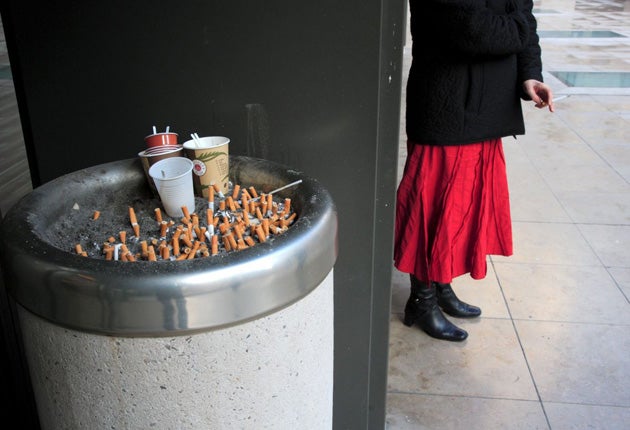Workers are told to 'clock out' when nicotine calls

A front has been opened in the continuing struggle between smokers and their employers, with growing numbers of local authorities forcing their staff to "clock out" every time they take a cigarette break.
Yesterday, it was the turn of Norfolk's Breckland Council to impose the new rule. Pro-smoker lobbyists said the move by Breckland to require employees to take time out when they need a cigarette was the latest example of a public sector body taking "tyrannical" action to govern the breaks of smokers which did not apply when workers simply stepped away from their desks.
Since the ban on smoking in public places came into force in England and Wales in 2007, huddles of smokers have become a common sight outside office buildings as they comply with legislation which bans smoking rooms and requires a smoke-free working environment.
But the ability of the 22 per cent of adult Britons who smoke to indulge their habit outside the workplace is coming under renewed scrutiny from local authorities.
At least six councils, including one county council, require staff who smoke to either work additional hours to take into account their smoking breaks or take time out every time they have a cigarette. They include Newcastle City Council, Thurrock Council in Essex and Carmarthenshire County Council.
Forest, the group which lobbies for smokers, said that smokers were being unfairly singled out for additional restrictions. Director Simon Clark said: "Are they going to introduce clocking in and off for people who go on the internet, on Facebook, or people who want to have a cup of coffee? Many smokers believe having the occasional cigarette allows them to refocus."
Officials at Breckland Council, which has its headquarters in the market town of Dereham, said the new rule had been introduced to tackle a perceived unfairness at the amount of time taken to have cigarettes by the 20 per cent of its staff who smoke. William Nunn, the council's Conservative leader, said: "I think people have to accept that some non-smokers do feel a little bit of resentment across the table when they are sitting there and their colleagues keep getting up and going out of the building.
"We are not trying to stop smoking, What we are saying is that when people go for a cigarette, they should do it in their own time."
Employment experts said that most private sector companies had stopped short of specifying that workers must subtract their smoking breaks from their working day and instead required any such breaks to form part of their statutory rest periods. Companies such as British Airways and HSBC, two of Britain's biggest employers, said they had no particular policy on smoking breaks and expected staff to "apply common sense".
Ben Willmott, senior public policy adviser at the Chartered Institute of Personnel and Development, said: "There is an issue of fairness here. In many cases, smokers might welcome the opportunity not to have a cigarette – the research shows that seven out of 10 smokers would like to give up."
In Dereham, smokers begged to differ. Doreen Harvey, 71, said: "We are already out in the cold. I do think it is unfair. If they had done that to me in my day, I would probably have told them to stick the job."
The anti-smoking tide
1954 British researcher Richard Doll confirms the link between smoking and lung cancer.
1965 British government bans cigarette advertising on TV.
1971 Health warnings are printed on all cigarette packets.
1976 Prof Doll publishes a 20-year study which concludes that one-in-three smokers die from the habit.
1997 Labour government pledges to ban tobacco advertising.
2004 Irish Republic introduces the first comprehensive smoking ban in Europe.
2006 Scotland bans smoking in public places.
2007 Smoking bans for public places are instituted in England, Wales and Northern Ireland.
Join our commenting forum
Join thought-provoking conversations, follow other Independent readers and see their replies
Comments
Bookmark popover
Removed from bookmarks